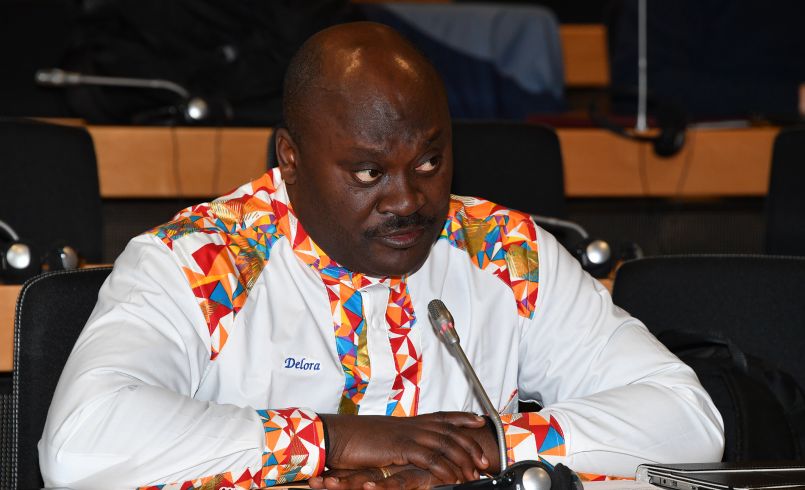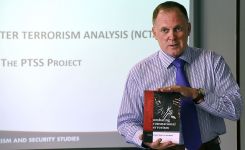- George C. Marshall European Center for Security...
- Security Professionals Improve English Language...
Security Professionals Improve English Language Skills to Fight Terrorists
Security Professionals Improve English Language Skills to Fight Terrorists

By Christine June
Public Affairs Office
George C. Marshall European Center for Security Studies
GARMISCH-PARTENKIRCHEN, Germany (March 12, 2019) – To feel more confident speaking about counterterrorism topics in a language that is not their native tongue, seven security professionals from that many countries attended the custom-made, five-week English Language Enhancement Course at the George C. Marshall European Center for Security Studies.
They graduated from this course during a ceremony held March 12, and the next day, they joined 56 new classmates from an additional 40 countries for the Marshall Center’s Program on Terrorism and Security Studies.
“The English Language Enhancement Course is really, really important to the PTSS program, because participants need the confidence and ability to speak in English and in public to tell their classmates from around the world what’s happening in their countries regarding security studies and terrorism,” said retired U.S. Marine Corps Col. James Howcroft, Marshall Center’s PTSS program director.
“Without this English course, they wouldn’t have this confidence to speak up and share,” Howcroft said. “If they don’t share, they won’t be valuable members of the program.”
Special Agent Thomas F. O’Connor, with the U.S. Federal Bureau of Investigation’s Joint Terrorism Task Force, is a PTSS alumnus and frequent guest speaker. He presents on right-wing terrorism and with his wife, Jean, who is a PTSS alumna and also an FBI special agent, on evidence and prosecution.
“The ability to communicate in class and in breakout sessions is invaluable to the overall success of the PTSS. The interaction during the PTSS is one of the most important parts of the PTSS,” he said. “The ELEC does the job. It is amazing to see how quickly the program teaches students to communicate.”
Candidates nominated by their governments to attend PTSS are required to be fully proficient in the English language. Proficiency is tested via an English comprehension-level test administered at more than 120 U.S. embassies worldwide.
The team at the Marshall Center’s Partner Language Training Center Europe tailored this intensive English course for candidates attending the Marshall Center’s Program on Terrorism and Security Studies.
“It’s not about learning the language, all these students already knew how to speak English before they arrived here,” said Roxane Harrison, program manager at PLTCE’s English Language Programs Department. “This course helps them to improve their oral communication and listening comprehension skills, while focusing on course-related terminology necessary for successful attendance in the PTSS resident course.”
“We want them to be able to communicate at a professional level on security topics,” she said
Stoyan Pavlov Valchev, senior inspector for the Specialized Unit for Combating Terrorism at the Bulgaria’s Ministry of Interior, said that this English language course was useful for him.
“I learned a lot of counterterrorism words in English, many I did not know before I attended this course,” said Valchev, who later explained that he did not have much opportunity to speak English in his daily job and life in Bulgaria.
Gendarme Lt. Col. Cyrille Kouassy Yao-Delora, deputy commander of the 1ST Mobile Gendarmerie Legion Abidjan for the Gendarme Nationale and Ministry in Côte d'Ivoire, also said that he did not have a lot of opportunities to speak English before attending this course. In his country, they speak French.
“This was a good opportunity for me to improve my English skills,” said Yao-Delora. “Before coming here, I had problems speaking English in public, but after five weeks, I am very confident now to talk and to discuss not only about counterterrorism, but also about many security topics.”
Both Valchev and Yao-Delora said that they spoke English every day during the weeks in the classroom and with each other during three meals a day and outings during the weekends.
Their instructor, Thomas Soule, tailors the curriculum and vocabulary needed by security professionals who fight terrorists, focusing on presentation skills, public speaking practice and discussion strategies.
“At the same time, they are also improving their understanding of the nature of other security threats affecting the global community,” Soule said.
The curriculum also includes reading publications and newspaper articles, watching videos, listening to presentations by the PTSS team, and participating in classroom discussions about today’s counterterrorism and security studies challenges.
While in ELEC, participants also received an introduction to GlobalNET, an internet-based system that connects Marshall Center’s more than 13,300 alumni from 155 nations.
They also learned about the Marshall Center’s “per Concordiam” magazine, which is a quarterly journal covering European and Eurasian Security and defense issues.
Participants then learned about the books available for their research both at the Marshall Center and when they return home during a library database brief provided by the Marshall Center Research Library staff. They also learned how to work with the library's database to find current information.
Held twice a year, the Program on Terrorism and Security Studies is a four-week program that supports the Marshall Center's increasing emphasis on transnational threats and challenges. It provides advanced professional education to those charged with understanding and then, reducing the scope and capability of terrorism threats.
The Marshall Center is a 25-year-old German-American security partnership that has produced generations of global security professionals schooled in American and German security policies.
The Marshall Center was designated in October 2014 by the U.S. Department of Defense as a Center of Excellence for Transnational Security Studies, due to its programs on counterterrorism, and cybersecurity and organized crime.
These graduates were strangers when they came here five weeks ago.
“For me, the biggest benefit meeting my classmates from six other countries,” Valchev said. “We have built a partnership and friendship. We are able to discuss any question together, and we are ready for PTSS.”


